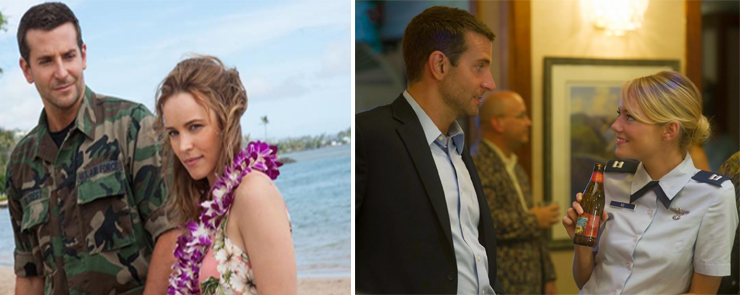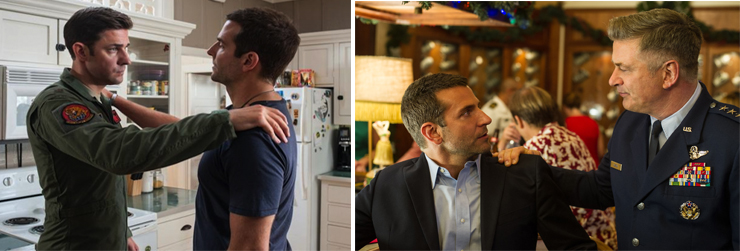
LEFT: (from left): Bradley Cooper, Rachel McAdams, RIGHT: (from left): Bradley Cooper, Emma Stone.
About a half hour into Aloha, Cameron Crowe's aggressively quirky tale of second chances and colonial tug of wars, I was all but ready to throw in the towel. “There's a disparity between the screenplay's contrivances and the filmmaker's calculated efforts to seem loose and off the cuff,” I scribbled furiously in my notepad. The cutesy bon mots in the meet cute scenario that kicks off this Hawaii set comedy assaulted my eardrums with abandon. “Keep Crowe far, far away from Puerto Rico,” I scrawled, adding exclamation points for emphasis.
At first glance, the Say Anything auteur's eighth feature comes across as the kind of big-screen fiasco all the reportedly poor test screening scores and leaked studio-exec frustrations would suggest. Reluctantly because I actually like Crowe's work I braced myself and prepared to take out the knives for what I was sure to be one of many pans the film will have to withstand.
Then a funny thing happened. Even though and I can't stress this enough it wasn't love at first sight, I started liking the film. I made a conscious choice to just go with its unabashed sentimentality, and it's almost as if Crowe was waiting for me to do that, because it was quite palpable when, all of a sudden, Aloha met me halfway.
The story's serviceable enough. Military contractor Brian Gilcrest (Bradley Cooper) flies back to Hawaii, where he grew up, ostensibly to negotiate a gate blessing ceremony with the native residents, but ultimately with a more shady hidden agenda, masterminded by former employer Carson Welch (Bill Murray). Air Force pilot Allison Ng (Emma Stone) is on hand to babysit and help Brian navigate the murky waters of dealing with local authority figures who feel the U.S. invaded their pristine land and ought to let them take it back. The local military brass hopes Brian's baggage, eventually revealed in Crowe's roundabout way, doesn't muck this up. General Dixon (Alec Baldwin, gruff and blustery) is especially skeptical of Brian's chances.
The homecoming serves a double purpose for Brian, who reconnects with old flame Tracy Woodside (a radiant Rachel McAdams), since married to strong-silent-type pilot Woody (John Krasinsky in a well executed, nearly wordless turn). Their marriage, it soon becomes clear, is not going well. Will Tracy make a move to rekindle the flame? Ah, but Allison, you see, is smitten with the cynical hired hand, even after she finds out the lengths of Brian's paranoid, distrustful nature.

LEFT: (from left): John Krasinski, Bradley Cooper, RIGHT: (from left): Bradley Cooper, Alec Baldwin.
Crowe takes all these elements, which hark back to his earlier work Singles, anyone? and adds an earnest, mostly ill-advised helping of Hawaiian mysticism to coax Brian and Allison's unlikely courtship. The results are messy and more than occasionally cloying. And yet, there's something winsome about Crowe's shaggy-dog whimsy, his refusal to take the expected rom-com route the film's generic ads highlight all too willingly. It was at this point that I said to myself, “Oh, to hell with my defenses,” and surrendered myself.
My assessment? Crowe has made an erratic yet thematically ambitious valentine to the 50th state, a dewy-eyed romance/critique of the military-industrial complex peopled by characters who are more complicated than they first appear.
When their wrinkles come out, it's heartening to behold, even when their behavior amounts to little more than blatantly manipulative storytelling maneuvers. It helps that the production values are so impeccable, particularly Clay A. Griffith's lived-in production design. (Tracy and Woody's home, for instance, serves as a secondary character.) It also helps that Crowe inserts sequences like, say, a holiday party that does little to advance the narrative but brims over with texture and ambiance, and lets them play out with stream-of-consciousness nonchalance. He merges a lightness of spirit that recalls Ernst Lubitsch with a jazzy mise en scene that brings to mind Robert Altman.
Aloha is a featherweight concoction that's fuzzy in the head and squishy in the middle. Yes, there's even an obligatory happy couple montage, but the film is also nuanced and eccentric in ways that are very unusual for a studio comedy. How well you respond to it will strongly depend on how receptive you are to its laid-back wavelength. It's goofy and pretty much all over the place, but that's part of its ineffable charm.
It doesn't say anything about relationship troubles Crowe hasn't conveyed more cogently in his previous films, but his affection, toward its characters as well as its lush setting, is pretty contagious. (The claims that it's a whitewashed depiction of Hawaii is hogwash.)
It expresses, with unapologetic shamelessness and sneakily poignant eloquence, that sometimes love does conquer all. And sometimes you just need to hear that. Know what I mean?




